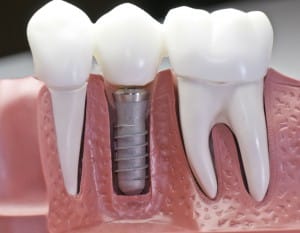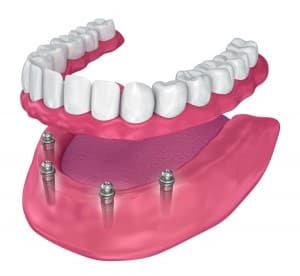
As technology improves and the options for patients widen, more people are choosing dental implants to meet their needs. These little wonders are metallic mounts that are placed inside of a patient’s gums, with a surface area exposed. That area contains a setting, where a doctor can attach replacement teeth.
 What makes this such a great alternative to dentures is the permanence. Dental implants are a long term solution that doesn’t require you as the patient to remove or reinsert dentures. They are as strong (sometimes stronger) than natural teeth, so they can bite into tougher foods that might usually be difficult to eat, like apples, steak or hard candies.
What makes this such a great alternative to dentures is the permanence. Dental implants are a long term solution that doesn’t require you as the patient to remove or reinsert dentures. They are as strong (sometimes stronger) than natural teeth, so they can bite into tougher foods that might usually be difficult to eat, like apples, steak or hard candies.
Maintenance is as simple as with your naturally born teeth. You brush, floss and have them checked regularly by a dentist. They don’t require special adhesives or solvents, which can be costly, inconvenient and sometimes ineffective.
Aesthetically, they are also more appealing. Dental implants stay in your mouth at all times and have the appearance of normal teeth. Dentists strive to place them in as straight as possible, giving you a full mouth of beautiful pearly whites that will brighten your smile permanently.
There are some stories of dental implants failing. But according to most sources, the average success rate of these tools are 98%.
What’s Happening When Your Dental Implant “Fails”
While most patients will have no complications related to their dental implants, they can occasionally fail. When that happens, you may feel the following symptoms:
- Severe pain or discomfort in the gums or teeth.
- Swelling or inflammation of the gums.
- Tenderness at the site of implants.
- Excessive gum bleeding or the gathering of pus.
- The implant being loose, wiggly or not remaining in place.
These complications are rare, but serious. If you experience any of the above it could be a sign that your dental implants have failed and your mouth is rejecting the foreign body. You should contact our office immediately to set an appointment, or if problems are severe or you are experiencing a fever (sign of infection) you should call for an emergency visit or go to your nearest emergency room (ER).
Common Reasons Why An Implant Would Fail
Foreign body rejection- Sometimes your body will read a dental or biomedical device as a dangerous invader, such as an infectious bacteria or virus. When this happens your system will reject that object and refuse to allow the area to heal. Fever, pain and other symptoms can develop.
Peri-implantitis – Not all rejection happens the same way. Occasionally the hard and soft tissues surrounding the implant will begin to degrade, soften to break down. The effect is similar to periodontal disease, or the recession of gums away from the teeth.
Nerve and tissue damage- Both the tissue and nerves around an implant can become damaged, especially if there was nerve exposure prior to the placement of the implant. This can cause serious pain in the patient.
Failed osseointegration- In a successful procedure, the implant will fuse with the jaw bone and the replacement tooth will settle securely on the implant site, creating an integrated tooth. When osseointegration fails, the bone will not fuse and so the tooth will be loose or painful.
Failure of the implant itself- At times there may not be a failure with the procedure but with the implant itself. If the metal fixture is in some way defective it can compromise the integrity of the entire site. It also may cause the above conditions to occur.
Sinus problems- When the implant intersections with the sinus cavity, or if it is close enough to cause agitation, the patient can develop sinus infections. Getting a bone graft or sinus lift prior to implantation can reduce the risks of this problem.
Allergic reaction– Very few patients will have an allergic reaction to an implant because negative reactions and allergies to the metals most commonly used (titanium, nickel, chromium, molybdenum and cobalt) affect such a tiny portion of the population. However, if there is an allergy that is unknown or not in past medical history, it will often become apparent due to symptoms during the initial preparation stages, prior to inserting an implant.
Overloading- Overloading occurs when there is improper support for an implant, or if there is too much pressure put on the use of too few implants. For example, a patient may choose not to get jaw reconstruction because it is too expensive, but that provides an unstable foundation for the implant. Or they may get one implant when three are needed, so too much force is put on the one.
Bridge Creek Dental Can Treat Implant Failure
There are many ways that Bridge Creek Dental can help you in cases of dental implant failure. We can assist you:
- If you have peri-implantitis and are experiencing tissue loss, softening or abscess.
- If the bone around your implant has been damaged in some way, including the bone.
- If you’re experiencing nerve and tissue damage, or pain associated with either.
- If osseointegration fails and your implants are not properly securing your replacement teeth.
- If you experience an allergic reaction or suspect you may be allergic to the metals of your implant.
- If your body simply rejects the foreign object and you are not properly healing.
Ways You Can Prevent Failure Of An Implant
Always follow your dentist’s instructions for care both before and after your procedure. It is important that you are aware of what is necessary to care for implants and replacement teeth, including cleaning.
If a bone graft is recommended before placing an implant, you should do so. The dentist performs bone gradfts to ensure the best possible outcome for your dental implant. Contact your dentist right away if you are experiencing abnormal discomfort or symptoms.
Take all antibiotics and medications for the duration of the prescription, as ordered by your dentist. And during your aftercare, you can avoid causing damage by avoiding hard foods, or foods that easily get stuck between your teeth.
Are You A Candidate For Dental Implants?
You may be a candidate for dental implants if:
- You are missing one or several teeth, including front teeth
- You want something more durable than dentures
- You are looking for options that last a lifetime
- You desire natural, real looking teeth
- You want more comfortable options
- You want to improve your smile
- Your speech is currently impacted by your teeth
- Your self esteem has been hurt by tooth health
- You are looking for a way to eat easier
- You want to improve your oral health
- You are looking for something cost effective
If you experience any of these things, then speak with our dentist about possible alternatives to a dental implant:
- Insufficient bone density and volume
- Tooth grinding or clenching (bruxism)
- Osteoporosis
- Uncontrolled type 2 diabetes
- Smoking
Don’t worry if you suffer from any of the above, there are treatments available to you. However, addressing those conditions before getting implants will reduce the chances of implant failure in the future. Talk to your dentist about creating a plan for treatment.
Dental Implants And Your Dentures

Dental implants can be used in conjunction with full or partial dentures. The dental implant is used to secure your prosthetic appliance to your jaw. This elliminates the need for denture adhesives. Those with dentures also appreciate the confidence that comes with an implant secured set of dentures. They no longer fear that their dentures might slip or fall out in public while either talking or eating with others.
Receiving A Dental Implant At Bridge Creek Dental
At Bridge Creek Dental, we are dedicated to giving you the best possible experience and to assist you in making choices that work with your individual needs and health plan. We offer several services, including full dental implant procedures.
The first step is to set a consultation. An examination will be conducted and x-rays of the mouth taken to see the extent of damage to teeth, the jawbone and surrounding tissues. From there you and your dentist can discuss options.
If approved for dental implants, it may be necessary to perform a bone or tissue graft in order to properly secure the metal settings. This is done in a multi-step process and ensures a reduced risk of rejection or complications.
More Services You Can Receive at Bridge Creek Dental
COSMETIC DENTISTRY
BRIDGES
CROWNS
FILLINGS
IMPLANTS
DENTURES
EMERGENCY DENTISTRY
INVISALIGN
PREVENTIVE
ROOT CANALS
SEDATION DENTISTRY
TEETH WHITENING
VENEERS
Contact Bridge Creek Dental for your consultation today.